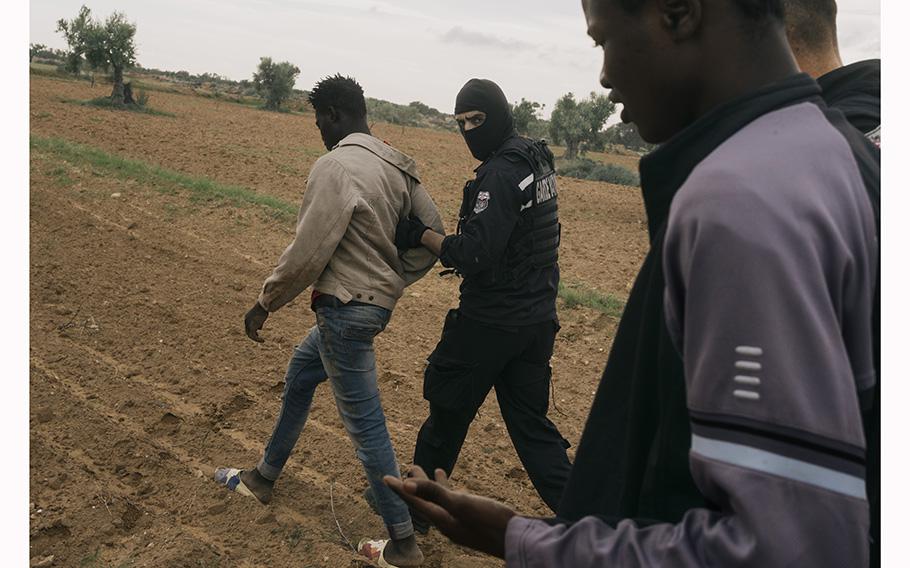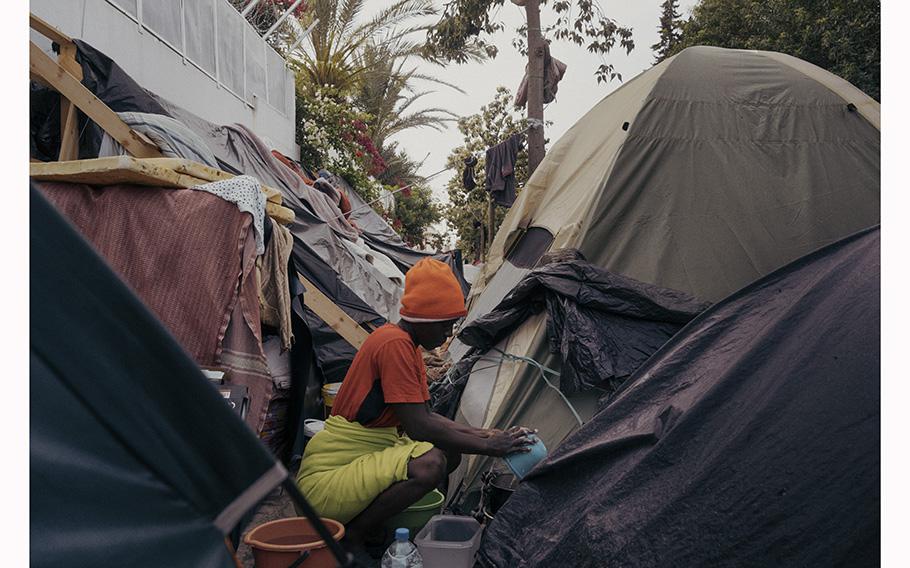
Agents from the Tunisian National Guard in Sfax, Tunisia, on June 1, 2023, arrest migrants who had been waiting in a safe house to board a boat to Italy. (Lorenzo Tugnoli for The Washington Post )
SFAX, Tunisia - The same February day that Tunisia's president warned of a "criminal plot" to overwhelm this predominantly Arab country with Black Africans, Komenan Assa's landlord evicted her.
"He told me to take my baby and go," said Assa, a 25-year-old Ivorian who moved to this port city five years ago. "It was clear to me: He was a racist who believed the president."
Weeks later, amid an eruption of aggression against Black Africans that followed the president's embrace of a "great replacement" conspiracy theory, Assa joined the exodus of people trying to escape. Her group made it eight hours in a flimsy steel boat, overpacked with migrants, before the vessel overturned in the Mediterranean Sea. As passengers struggled, her baby, Musa, was kicked out of her arms and drowned. Her boyfriend screamed her name before he went under, too.
Assa drifted on an inner tube for another two days before fishermen found her.
Now back in Sfax, robbed and spit on since her return, she is saving money with one goal: another run at the sea. "I cannot stay in this intolerance," she said.
Accounts like Assa's help explain a startling surge in migration to Europe this year - a surge propelled not just by well-established factors such as war, famine and poverty, but also by a violent campaign against Black Africans in Tunisia, inspired by the rhetoric of white nationalists.
"The president set a fire of hatred and hasn't been able to put it out," said Ramadan ben Amor, spokesman for the Tunisian Forum for Economic and Social Rights. "It may take years for this hatred to ease. Now, the bodies of Sub-Saharans are washing up on our beaches because they have been pushed to board death ships to Europe."
While the numbers have fallen on most of the main migration routes to Europe compared with the first five months of last year, the figure has more than doubled for those arriving via the Central Mediterranean, according to Frontex, the European border patrol agency.
Tunisia has leapfrogged Libya as the main launching point. Irregular arrivals from Tunisia through May rose more than sixfold to about 26,000, accounting for half of Central Mediterranean crossings, according to the U.N.'s International Office on Migration (IOM). Another 22,000 people were turned back by Tunisian patrols - with the strong backing of European nations.
And at least 1,000 people lost their lives while attempting to cross from Tunisia this year - part of what the IOM describes as the highest death toll on routes from North Africa and the Middle East since 2017.
Many of those trying to leave Tunisia are sub-Saharan Africans who have been here for months or years, aid groups say. Some transitory migrants and small numbers of Tunisian nationals are leaving, too. But asked if the surge would have occurred without the rise in anti-Black sentiment here, Paola Pace, Deputy Chief of Mission in charge of the IOM's office in Tunisia, said "no."
"Racist roots and consequences of migration policies need to be recognized and overcome everywhere," she said.
Top officials from the European Union, Italy and the Netherlands have held crisis talks with Tunisian officials in recent weeks, but they have largely avoided public mention of the aggression against Black Africans that has sparked evictions, firings, arrests and brutal assaults and made people desperate to leave. In fact, a preliminary plan agreed among European leaders this month identifies Tunisia as a safe country that could receive the E.U.'s rejected asylum seekers if repatriating them to their birth nations proves complicated.
European leaders have focused their ire on human traffickers and expressed distress over the number of people who have died this year in the central Mediterranean. Officials are also privately anxious about projections that migrant arrivals to Europe this summer could top hundreds of thousands. They fear a reprise of the refugee crisis - and political backlash - of half a decade ago.
So they have made deals with the Tunisian government, pushing for more-aggressive border enforcement and anti-trafficking efforts. The E.U. has offered $100 million to finance these efforts. German Federal Police are training Tunisian patrols, and the Italians have supplied them with boats, engines and spare parts.
At the same time, recognizing that Tunisia is teetering on the verge of economic collapse, European leaders have dangled the prospect of nearly $1 billion in aid and investment, including $162 million up front, and they have lobbied the International Monetary Fund on Tunisia's behalf.
"We're working . . . not only [on] migration, but also helping Tunisians in this difficult moment," Italian Prime Minister Giorgia Meloni told reporters in Brussels on Thursday ahead of a European leaders summit.
Prodded by Europe, the Tunisian government has ramped up enforcement, conducting 58 special intelligence operations in May that curtailed Mediterranean crossings and yielded the arrests of 74 people suspected of involvement in human trafficking.
During a recent patrol aboard the Tunisian Coast Guard vessel Aigle 3505, officers studied radar screens for hours, looking for blue trails leading in a straight north-by-northeast direction - toward the Italian island of Lampedusa, 100 nautical miles from Sfax. After an 11-hour overnight patrol, the ship had rounded up 240 sub-Saharan Africans, confiscating their motors and leaving their boats at sea for later towing.
"They accuse us of racism," said Coast Guard Commander Mohamed Chamtouri. "I show them videos of Tunisian migrants we've stopped, too. I tell them it's not racism. It's saving their lives."
On deck, 32-year-old Fanta Kone stood among a throng of Black migrants, her chest heaving as she struggled to contain her rage. It was her seventh attempt to cross the Mediterranean and the seventh time she'd been seized by Tunisian patrols. She first tried in December, propelled, she said, by Tunisia's flatlining economy. But she said she felt new urgency after she was fired as a cosmetician at a Tunis salon and kicked out of her apartment "because I am sub-Saharan."

Kadija Tokaba on May 25, 2023, in the encampment in Tunis, Tunisia, where she lives with her family. (Lorenzo Tugnoli for The Washington Post )
"It's like we are being kept in a jail here in Tunisia," she fumed. "Let us go! The situation in Tunisia now exceeds the word racism."
Aid groups, activists and immigrants say the seed was planted by Tunisian nationalists, who adopted a version of the "Great Replacement" conspiracy theory embraced by white nationalists in Europe and the United States. A plan was afoot, their theory went, to overrun Arab Tunisia with ethnic Black Africans.
Tunisian nationalists shared a Great Replacement "study" with the office of President Kais Saied, who soon after amplified their ideas. In a Feb. 21 national security council meeting - summarized by the presidency on Facebook - Saied called for national action against "uncontrolled immigrants from sub-Saharan Africa." He also decried a "criminal plan" to repopulate Tunisia and change the Arab nature of the country.
"It started as this completely crazy conspiracy theory that Sub-Saharans were trying to colonize Tunisia, to make Tunisia Black Again," said Zyna Mejri, founder of the Tunis-based fact checking group Falso. "Then the president - who loves conspiracy theories - backed it. And it became a disaster."
Discrimination against sub-Saharan Africans exploded into view. Tunisian authorities accelerated arrests, detaining 3,700 people through April. Thousands more faced eviction and lost their jobs. In an online video since removed from TikTok, a landlord was seen pushing tenants into the street while yelling racial epithets.
According to more than 25 Washington Post interviews with victims, aid groups and activists, Black Africans have been assaulted, robbed, spit on, raped, stabbed and dragged through the streets. Last month, a man from Benin was hacked to death by a group of young Tunisians.
European leaders have tread lightly with Saied, even as he has grabbed power and thwarted the promise of democracy in a country that was the cradle of the Arab Spring. This time, too, European officials remained more focused on the potential for economic instability in Tunisia to further open the floodgates of migration.
But while Europe remained quiet, the African Union condemned the "racial statements." The World Bank suspended cooperation with Tunisia. And the Ivory Coast and Guinea-Bissau organized repatriation flights to bring their nationals to safety.
In a March meeting with the president of Guinea-Bissau, Said rejected allegations that his statements were racist. He said he'd had African friends at law school and that some of his family members had married sub-Saharan Africans. The Tunisian government announced a hotline for sub-Saharans facing threats - though Mnemty, a Tunisian anti-racism group, tested the number and said its calls were never answered.
In an interview with The Post, Tunisian Foreign Minister Nabil Ammar called allegations of Tunisian racism "completely unfair." Ammar insisted the president was not backing the replacement theory but rather acknowledging its existence.
"He didn't write this study," Ammar said. "He didn't say he agrees with what the conclusions are. He only cited . . . this theory [to say it] has been written. It doesn't mean that you are the author of this or you are supporting this."
It did not feel like that on the ground.
Michael Bio, a 29-year-old graduate student from the Ivory Coast studying aeronautical engineering in Tunis, described the anti-Black aggression as "terrifying."
"If you were Black and in the streets, you were going to get arrested - or you were going to get hurt," he said. Following a rash of attacks, universities arranged online classes so students could shelter in place. Bio said he took in three other students who had been kicked out of their homes.
In Sfax, The Post spoke with four survivors of a May 23 robbery and machete attack by Tunisian youths that left them with stab wounds and a crushed eye. A fifth man - a 34-year old father of four whom they described as their "mentor" - died of head injuries.
Ibrahim Mokhtar, a soft-spoken 22-year-old from Benin and one the survivors, noted that Tunisian police had already made several arrests in their case. "They are taking it seriously," he said. And Tunisian neighbors, he said, had rushed them to a hospital. Other Tunisians, he said, had offered them guidance on how to report the crime.
"Tunisians have also helped us," he said.
But, he said, the four remain afraid. "We will not leave our homes after 5 p.m.," he said. "The city is dangerous for us. It is dangerous."
Aziz Turay, a Sierra Leonian who arrived in Tunis in 2021, is now living with his wife and infant son in an encampment outside the IOM headquarters, asking for relocation "to anywhere."
On the day of president's statement, Turay said his landlord ordered them out. "He said to us, 'The president doesn't want to see any Blacks in the country. You have to go.'"
When Turay refused, he said the landlord called the police. Turay was jailed for a week for not having legal papers. After he returned once more to the apartment, he said his landlord called "the Arab boys," who swarmed the room wielding knives, stole their savings and forced them out on the street. He lifted his sleeve on a recent afternoon to show a reporter a scar from where he had been stabbed.
"If it was only me, I would go now," he said. "I don't want to take my wife and baby on the boats. But we cannot stay here."
The Washington Post's Stefano Pitrelli in Rome contributed to this report.